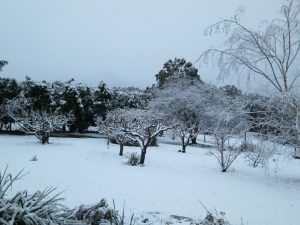Each season has unique characteristics. Winter health relies on warm food, introspection and rest. In cooler climates, frosty mornings, clear sunny days and warm fires are a part of our experience of winter. Eastern approaches acknowledge the special nature of this season through the prescription of certain foods and activities to maintain winter health. Whilst bears hibernate during winter, humans can take advantages of shorter daylight hours to catch up on sleep.
Warm foods for winter health
Winter is the ideal time of year for slow cooking — casseroles, curries and meals prepared in a slow cooker. You might like to try my pumpkin soup, dhal and yellow curry recipes. The addition of spices provide additional flavour and warmth:
- Cinnamon, cloves, fennel seeds, fenugreek seeds and ginger can be added to teas, curries and casseroles.
From a Traditional Chinese Medicine viewpoint leek, chives, garlic and onion also add a warming attribute to food. Wholegrains such as rye, barley oats and quinoa are very satisfying foods that make a great mixed grain breakfast porridge, or they can be served alongside a meal. Include steamed leafy green vegetables too. You may also refer to my three top tips for winter.
Winter health involves ‘going within’
Eastern traditions view winter as the time of year to cultivate self-knowledge and develop inner wisdom. It is considered yin in nature, so perfectly aligned with reflection and meditation. If you are new to meditation, a simple introductory practice is to focus your attention on your breath. To begin with you might like to set aside 10 minutes in the morning and another 10 minutes in the evening. Focus your attention on your in-breath and then on your out-breath. If you find that your mind wanders onto other thoughts just gently refocus on your breath.
Also take notice of how you are breathing. When you take your in-breath does your chest or abdomen rise? If you find that your chest is rising and falling with your breath, then gradually retrain your abdomen to rise with the in-breath and fall with the out-breath. This is the way newborn and young children breath. As you retrain in abdominal breathing, you will notice that your breath will lengthen. You will also find this type of breathing calming and re-energising.
Sleep is central to winter health
With the invention of electricity came a gradual change in our appreciation for sleep. Our working day lengthened, our waking hours extended and our sleep time decreased. Research studies have shown that one of the best ways to reset our sleep clock is to camp outdoors in nature. Even after a few days the body has relearned to feel tired and to sleep as night falls and wake up with the sunrise. So biologically we are in tune with the natural cycle of light and darkness.
I am not suggesting you go camping in winter, but allow your body and mind to fall back into the natural sleep and wake cycles. This will take a little help from you though:
- Set an earlier time for bed.
- One hour prior to bed stop viewing the TV, computer, tablet and smart phone, and dim your lights.
- Have a warm shower or bath.
- If your mind is overactive, write down your thoughts (often outstanding things to do).
- Burn relaxing aromatherapy oils that include lavender. Look for a relaxation or sleep blend.
Recharge your batteries this winter
Allow yourself to become a little more yin this winter. This doesn’t mean you can give up movement all together. Just as the body and mind need rest, they also need appropriate exercise too. Keep your body warm with nourishing food, brisk walks and gentle stretching exercises, such as tai chi and yoga. Enjoy an extra hour or two of sleep — guilt free — it is important for your winter health.
Reference
Paul Pitchford, Healing with Whole Foods: Asian Traditions and Modern Nutrition, North Atlantic Books 2002
